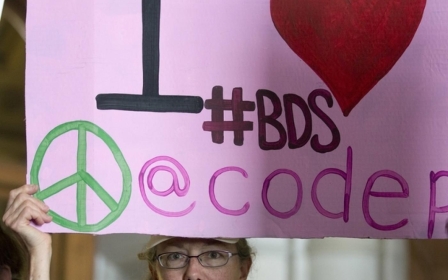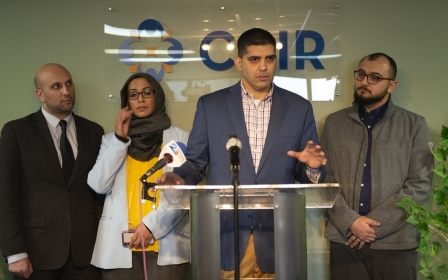'Weaponising anti-Semitism': Florida Senate passes bill barring Israel criticism

A Florida bill that classifies certain criticisms of Israel as anti-Semitic has passed unanimously in the state Senate, despite drawing sweeping condemnation from Palestine and free speech advocates who say the legislation violates the United States Constitution.
The bill, known as HB 741, passed on Monday in a 40-0 vote in Florida's upper legislative chamber.
It was passed just days after a US federal court judge struck down a controversial an anti-Boycott, Divestment and Sanctions (BDS) law in Texas, saying it breached Americans' First Amendment right to free speech.
In fact, the Florida bill is one of several pieces of legislation in US states that would restrict criticism of Israel over its human rights abuses against Palestinians, as well as define those critiques as anti-Semitic.
'Freedom [of speech] is at risk of being thrown down the drain with this kind of legislation'
- Wilfredo Ruiz, Florida's Council on American-Islamic Relations
"In a nation where freedom of speech has been gained through blood, sweat and tears … we find that that freedom is at risk of being thrown down the drain with this kind of legislation," said Wilfredo Ruiz, communications director for Florida's Council on American-Islamic Relations (CAIR-Florida).
Specifically, the Florida bill outlaws religious discrimination in schools, including universities and colleges, and mirrors the Anti-Semitism Awareness Act that was introduced in the US Congress last year.
But the definitions of anti-Semitism used in the bill criminalise certain criticisms of Israel, causing the legislation and others like it to come under fire from human rights groups and legal experts.
According to Ruiz, the bill is an attack on core American values.
"The question is, who is this legislation for?" he told Middle East Eye in an interview a few weeks before the legislation was passed in the Senate.
"It's certainly not for the American people because this is an attempt against the American people's constitutional rights."
Florida's bill
The Florida bill was introduced by State Representatives Randy Fine and Mike Caruso, both of whom did not respond to multiple MEE requests for comment.
During its cycle through the state legislature, opponents said that while they supported efforts to outlaw religious discrimination in schools, the bill's guidelines for what can be called anti-Semitic were problematic.
Among other examples, the bill defines anti-Semitism as "applying a double standard to Israel by requiring behavior of Israel that is not expected or demanded of any other democratic nation, or focusing peace or human rights investigations only on Israel".
Groups such as the American Civil Liberties Union (ACLU) say that clause may bar students from holding protests that criticise only Israel, without mentioning other nations' human rights violations.
Alan Levine, a civil rights and constitutional lawyer based in Florida, told MEE that the legislation is part of a "next generation" of bills seeking to silence those who would challenge Israel.
"This is the second wave of pro-Israel legislation. The first was directed at boycott efforts," Levine said, referring to legislation that has targeted BDS, a campaign that seeks to hold Israel accountable for its human rights abuses against Palestinians.
"And now it's weaponising anti-Semitism," Levine said.
The Florida bill will now be sent to the desk of Republican Governor Ronald DeSantis, a staunch backer of Israel who is expected to promptly sign it into law.
"Florida is the most Israel-friendly state in the country and we will not stand for discrimination against the Israeli people of any kind," DeSantis said in January.
"BDS is nothing more than a cloak for anti-Semitism, and as long as I'm Governor, BDS will be DOA [dead on arrival]. I cannot wait to strengthen the already unwavering bond between Florida and the great state of Israel."
In 2016, when DeSantis was a member of the US House of Representatives, Florida's legislature passed an anti-BDS law prohibiting public entities from contracting projects worth over $1m with any company or non-profit group that boycotts Israel.
Last year that law was expanded to remove the $1m threshold, meaning all projects, regardless of their value, would be subjected to the anti-BDS provision.
According to Palestine Legal, a non-profit group that advocates for Palestinian rights, Florida is one of 27 states that have enacted anti-BDS legislation as of March 2019. Fourteen other states have introduced similar legislation, as well.
Last year, US courts in Kansas and Arizona ruled that it is unconstitutional to force government contractors to refrain from boycotting Israel, blocking the anti-BDS laws in both states. Several others are being challenged in courts.
Levine said he thinks Florida's HB 741 similarly would be knocked down in court when challenged, but that process will take a long time to get through the judicial system.
"That's at the end of a long and very troubling road for young people, who just want to go out and make their views known," Levine said.
He added that the legislation also belittles what he called "real anti-Semitism".
"Anti-Semitism is about hating Jews; it has a long and ugly history ... there's no evidence as far as I can tell that criticism of Israel has anything to do with hatred of Jews," Levine said.
Palestine advocates undeterred
Reem Zaitoon, a student at Florida State University and president of the school's Students for Justice in Palestine advocacy group (SPJ), told MEE that the legislation will not stop her organisation from continuing their regular protests.
"Even with punishment and persecution looming above us, which can become very real, it won't stop us," Zaitoon said.
She said Palestine advocates in the US take their strength from the resilience and strength shown by Palestinians living under Israeli military occupation, who are "getting shot at every single week [and yet] continue to come out and risk their lives".
'Even with punishment and persecution looming above us, which can become very real, it won't stop us'
- Reem Zaitoon, head of Students for Justice in Palestine at Florida State University
"It's that kind of resilience that will make us stay and make us keep doing what we are doing no matter the cost, no matter the risk," Zaitoon said.
Levine, the civil rights lawyer, does not disagree, but adds that a law criminalizing protest represents a challenge for Palestine activists.
"Both on and off campuses, there's no question that people are going to feel intimidated by a bill that says, 'if you criticise Israel, if you point out their human rights violations … you may be subject to the penalties of this law,'" Levine said.
"That's really a deterrent; It's what constitutional lawyers call a 'chilling effect'."
But Zaitoon said the key will be to keep educating students about the realities of daily life for Palestinians - and encourage them to protest and to make their voices heard.
"To get a student agitated - that's powerful," she said. "Change really does happen through education."
Middle East Eye propose une couverture et une analyse indépendantes et incomparables du Moyen-Orient, de l’Afrique du Nord et d’autres régions du monde. Pour en savoir plus sur la reprise de ce contenu et les frais qui s’appliquent, veuillez remplir ce formulaire [en anglais]. Pour en savoir plus sur MEE, cliquez ici [en anglais].






